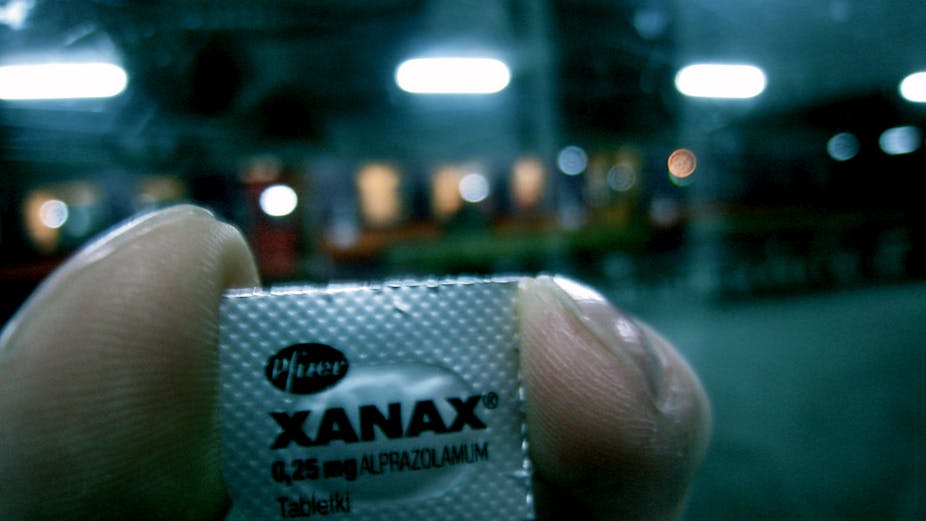The body responsible for regulating drugs in Australia, the Therapeutic Goods Administration (TGA), is poised to decide whether to restrict access to benzodiazepines, such as Xanax, Valium and Normison.
The drugs are commonly – but controversially – used to treat anxiety and insomnia. However, there is a growing body of evidence that they’re increasingly being misused.
A TGA committee meeting on Wednesday will consider rescheduling benzodiazepines to restrict their use.
More than 7.5 million benzodiazepine prescriptions were dispensed across Australia in 2010 - including more than 680,000 for alprazolam (AKA Xanax). The proposal is to move benzodiazepines from Schedule 4 to the more restrictive Schedule 8. Medicines on Schedule 8 are considered potentially addictive, and have an additional layer of monitoring and control to support quality prescribing, and reduce drug dependence and diversion.
Benzodiazepines are not first-line treatments for anxiety and there’s limited medical evidence of their efficacy beyond two to four weeks. In fact, they’re only approved and recommended for short-term use.
There’s good evidence that, in most cases, non-pharmaceutical treatment of insomnia and anxiety are as effective as these drugs. And that their benefits are more enduring, with less risk of adverse effects.
What’s the harm?
There’s been growing concern about the misuse and harms of benzodiazepines in recent years. The drug poses significant risks of misuse and dependence, paradoxical reactions, disinhibition, amnesia and intoxication.
There’s particular concern about alprazolam, a potent, fast-acting benzodiazepine that has been associated with serious health risks, such as misuse, dependence and crimes including traffic injuries, violence, property damage, blackouts, theft and overdoses. Alprazolam has also been implicated in a number of celebrity drug-related deaths, including Heath Ledger’s.
Benzodiazepines were responsible for 3,135 ambulance attendances in Victoria alone in 2010-11. In terms of all alcohol and drug related attendances, they were second only to alcohol, and there was a disproportionate increase in involvement of alprazolam compared to all benzodiazepines in ambulance attendances.
Health-care professionals, including general practitioners, needle syringe program workers and forensic workers, have experienced incidents of extreme violence and aggression resulting from Xanax misuse; this drug is often described as “angry pills”.
People who inject drugs or use opioids may take benzodiazepines for insomnia or anxiety, or to enhance the intoxicating effects of opioids. But benzodiazepine use causes particular problems for opioid dependent people.
One study found people using a benzodiazepine within 12 hours of using heroin were at 28 times the risk of overdose compared with those who did not. Several studies have found that opioid users who also take benzodiazepines have poorer health and are at greater risk of contracting HIV.
A study we recently published investigated prescription rates of alprazolam and its detection in heroin-related deaths over the past 21 years. We found there was a disproportionate increase in the supply of the high-dose two milligram formulation of alprazolam (compared to other formulations). We also found a significant increase in the detection of alprazolam in heroin-related deaths since 2005.
The relationship between the increase in supply and increasing detection in deaths was linear. While we can’t definitively know whether alprazolam contributed directly to the deaths, we know that opioids and benzodiazepines (and alcohol) are central nervous system depressants, meaning that it’s easier to overdose if they’re taken together. That people who inject drugs are increasingly using this potent benzodiazepine is a huge concern.
What’s the source?
While some prescriptions are provided directly to opioid users, recent research shows most (81%) people who inject drugs in Melbourne obtained alprazolam from illicit sources. Users pay between $3 and $5 for one tablet. A concessional prescription for 50 alprazolam tablets subsidised by the Pharmaceutical Benefits Scheme (PBS) costs $5.90, yielding a potential street value between $150 to $250.
This is a considerable profit for those on-selling their medication. And there’s been a considerable increase in reports of forged and altered prescriptions to obtain Xanax, which is the preferred brand name of alprazolam.
A 2012 Victorian review of reports of forged benzodiazepine prescriptions found 65% were for Xanax. This is the main reason why alprazolam should be rescheduled to S8. Before dispensing S8 drugs, pharmacists are required to recognise the prescriber’s handwriting or check whether she actually wrote the prescription.
Pharmacists report that it’s not uncommon for them to see prescriptions for 100 or 200 tablets. This is worrying for a product that has no proven benefit beyond short-term use.
Would restrictions help?
The proposed rescheduling of benzodiazepines could have significant infrastructure and workforce implications for already stretched addiction and aged care sectors. Still, many health professionals support a selective rescheduling of alprazolam because of the problems stemming from its higher potency.
The effectiveness of this kind of rescheduling is well demonstrated by the case of flunitrazepam (Rohypnol). This drug was rescheduled to S8 in 1998, leading to a significant drop its detection in heroin-related deaths.
Similarly, in May 2001, the PBS started to require authority for temazepam gel capsules, which became favoured for injection in the late 1990s (causing serious injection wounds and gangrene). This resulted in a reduction in its use by people who inject drugs. And the product was eventually withdrawn and remaining stocks destroyed by the manufacturer in 2004.
Given the success of the restrictions applied to flunitrazepam and temazepam, and the substantial harm resulting from the increased supply of alprazolam, we hope the TGA’s scheduling committee will acknowledge the evidence of its significant harms and make it more diffuclt for people to access alprazolam.

